Tales and Views From Namibia
Dance – A Weapon of Selective Destruction
Dave is a genuine eccentric. He is one of those people with a hyperactive brain who would probably have been labelled ‘problem' during most of his school life. He is a big shambling man in his mid-thirties, who when shaven headed could easily be mistaken for a lumpen skinhead thug.
Dave is, in fact, a highly intelligent garrulous computer boffin, who's conversation rattles along like a gatling gun, spitting out allusions, profanities and irreverent humour that he gets away with because by the time you have registered what he has said he is already far into the next flight of fantasy. He lives and works at Opuwo, in the far northwest – the home of the Himba.
Opuwo is a small town that is the African equivalent of the Galactic bar in Star Wars. The single main street is filled with small shops, bars with blaring music and a wide variety of people. Government services bring in people from many of the different tribes. Most would rather be in their homeland or the bright lights of Windhoek. There is a genuine African feel that would be recognised all over the continent. People stop and chat for a long time, youths gather outside of the bars, people hold loud conversations across the street or with people in cars that have simply stopped in the middle of the road. But what is striking is the presence of the Himba (and their sister tribe The Thimba).
The Himba are a small tribal group, who deal with the modern world, but appear strikingly unmoved by it. In a visit to a village, I asked the chief via a translator,
“What would improve life for you in the village”, he thought for a while, looked around the collection of mud huts with no water, electricity or modern amenities and said simply.
“Rain.”
He wanted his cattle to have grazing and their few crops to grow. Given the choice of a cow or a MP3 player the Himba youth has no trouble choosing the cow. What possible use would an MP3 player be in his life.
They struck me as looking very similar to the Hamer people of Western Ethiopia. The women wear only a skirt of goat skin, and their skin and hair are covered with red ochre mixed with fat. They wear only beaded adornments on their upper body and wrap themselves in a blanket shawl when it is cold. Hair styles mark your progress as a woman through to motherhood. They wander quite unselfconsciously in town and even in Windhoek shops in their traditional style. The men wear woolly bobble hats, western shirts and cotton wraps.
As with all tribal people, us westerners are endlessly beguiled and interested in their lives that are so far removed from our own. The name Himba means beggar and was given to them when they were driven into Angola by more aggressive tribes. Angolan's saw them as landless people having to beg for land. The Thimba, who look much the same, are seen as more industrious people whilst the Himba are locally thought to live up to their name. Although, the Government has put some energy into creating huts for them to settle and even created mobile schools in some areas the Himba are still semi-nomadic and when we visited a village some 40 kms out of town the young men were absent as they followed the grazing with the cows.
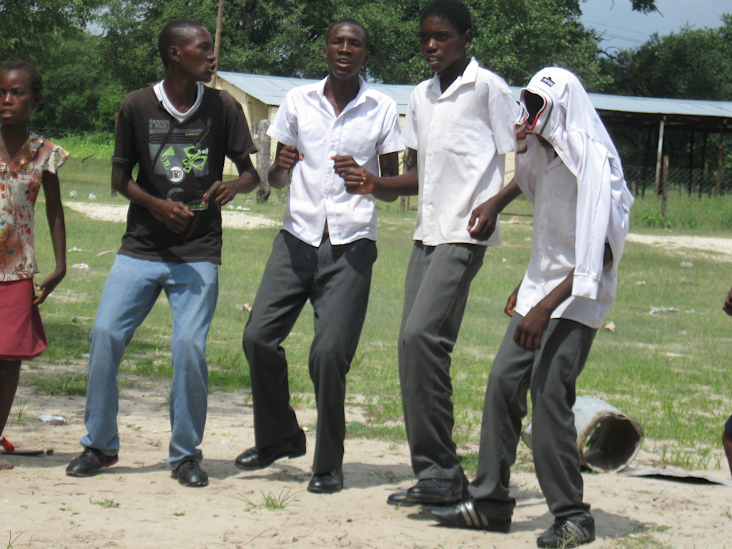
Dave works for the Health Ministry. He is recorded in the record as a female doctor, but in fact looks after all things cyber. Occasionally, he is drafted into help with vaccination programmes etc. and has been helicoptered to some very remote village communities. One day he was invited to an opening of some UNICEF sponsored latrines in a Himba village. Although they were late arriving, nothing had happened and as usual the village settled down to wait.
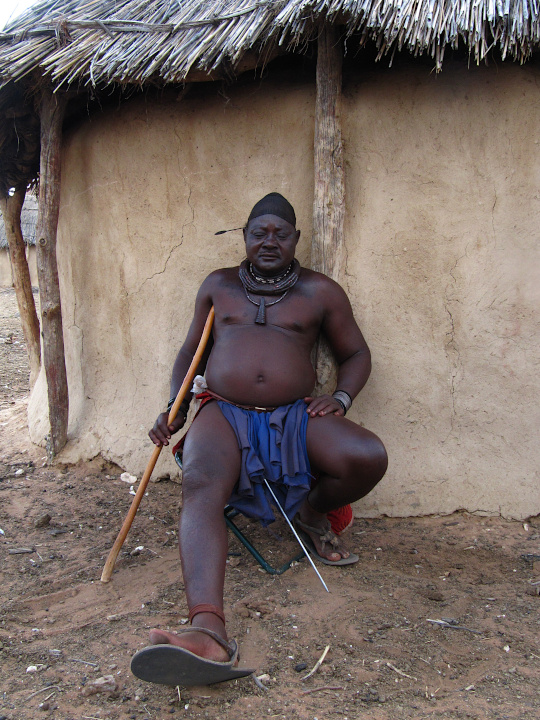
After some time, the younger women began to dance a jumping-style dance together in a circle.
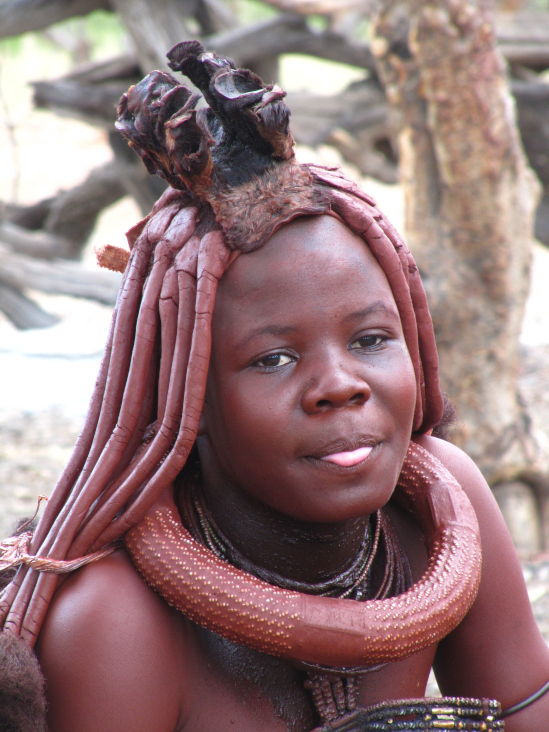
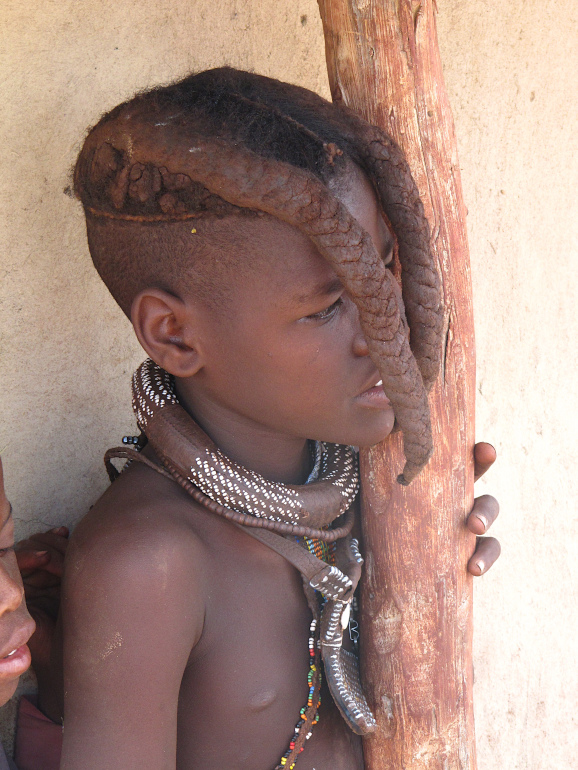
Although dancing is generally a female activity, on this occasion some men joined in for fun. Dave approached the circle to view the dancing, which was easy because he was at least a foot higher than anyone else. Gradually he was welcomed into the circle and encouraged to join the clapping. It was at this point that the dance moved into another gear. In turn, each woman went to the middle of the circle to dance and then rejoin the circle. Eventually, Dave was encouraged to display in the middle of the circle. Now remember that Dave is not built like Michael Jackson. He is a large man of some bulk. Nevertheless, Dave took up the challenge and was warmly received by all, including the oldest woman there. For her this was the funniest thing she had ever seen. She starts laughing. Then she laughs some more. Then she starts to laugh uncontrollably. Then she slowly sinks to the floor unable to breathe. The dancers stop because they realise that this is serious. Dave is visualising the headlines,
‘Health Ministry Volunteer kills Himba woman by dancing.'
Gradually, the old woman recovers and is sat up, her breathing restored. A concerned and worried Dave goes over to check that she is well. She looks up and sees him, points at him and starts laughing uncontrollably again, sinking once more into a seizure. This time as she recovers Dave vows never to do the Himba dance again. It is simply too dangerous, even if it is the most popular cabaret act on the circuit.
What The Struggle Really Meant
Do you remember hearing on the news about the fight against apartheid and the front-line states? For me it was a cause, a political struggle, a few people taking up arms, but it was mainly words.
When I came to Namibia, I heard talk about ‘The Struggle', saw the unassailable position of SWAPO (the main protagonists in The Struggle and now the overwhelming political party, like the ANC in South Africa), but I had no real sense of what it meant in people's lives. Because Namibia appears such a peaceful and gentle nation, at first there is little sense of the storm that ended little more than twenty years ago and had been going on for a hundred years.
As I grew closer to my work colleagues people began to talk more about their experiences. It started when, at lunch, I was talking to two women about their childhood years. I asked one where her home village was:
“I was born in the bush.”
“In a remote village?”
“No in the bush in Zambia.”
As she explained I realised that her mother had given birth to her child in the middle of nowhere. She had then dug a hole in the ground into which she crawled with her baby when South African troops attacked. She covered herself and the baby with leaves and branches to avoid detection.
I had been aware that the SWAPO movement had fought in Angola and Zambia and had a highly organised set of camps with health and education systems in place, but I had no real understanding of the impact on the lives of people. South Africa had annexed Namibia in 1983 introducing apartheid into everyone's daily lives. A black Namibian was not allowed to purchase white bread, without a note from a white employer. Blacks had to be out of white areas by dusk. Contract labour for mines split and distorted families. In Owambo land (my area in the north), where the resistance struggle was centred, the impact was even more concentrated. The South Africans saw, accurately, that the enemy was in their midst. They allowed the older population and women to stay. Local people were recruited to run local government administration and native policing services. Young people were frequently beaten up. No-one was allowed to travel south of the red line ( a cattle disease border about 100 kms from the Angolan border) without special permission. One man, who walks with a limp having been shot in the leg in Angola aged 18 years, told me that there was little choice for young Owambo men but to flee to Angola to join SWAPO.
I asked Othile, who's start to life was to be born in the bush, what had happened to her father. She told me without a hint of pain, that he had been shot dead in the fighting.
“I never knew what he looked like, but they tell me I look like him.”
“There were no photos?”
“No, the South Africans burnt down my grandmother's house. Everything is gone”
Not only did the South Africans burn the house but they damaged the people.
“My grandmother still cannot stand straight. Her back has been bent since that time.”
“What happened to her?”
“She was making pots in front of the house, and they drove a big army truck into her.”
My young manager, Frieda, had a different memory. Her father had been a doctor, he had a big house, which used to house fighters coming and going to Angola. She missed her father for seven years of her childhood when he and his close friend were put into prison. She also remembered a visit to her grandmother's village.
“We heard the South Africans were coming so my sister and me and my grandmother and grandfather crawled into one of those small, small huts for storing grain. Everyone else was beaten by the soldiers. When we came out, they had driven those big trucks up and down until all the houses were smashed to the ground.”
I asked them
“How can you even bring yourselves to talk to white people after all that happened?”
The response is always similar. These gentle people have a wonderful facility for forgiveness. Mainly they tell you that you have to move on and cannot keep living with anger. There has to be reconciliation. My fighter friend tells a story that often accompanies the atrocities of war. Old enemies can become friends later in life. He points to a white ex-soldier who now runs garage in Oshakati. He now drinks with an old SWAPO fighter. They are friends now. Somehow a sense of camaraderie exists between fighters who shared the same experience from different viewpoints. Another man tells me,
“Sometimes it is the people who did not fight that have the most anger towards white people – especially in the villages. You would be welcomed if you came to the village with me because I could explain who you are, but they would not accept me driving you because of the past. You would have to drive.”
Frieda says she has no bad feelings about white people, but would find it difficult to speak to a real old-style South African boer.
Othilie says,
“My mother still cries when we talk about it”
On a Wednesday in early May it is Cassinga Day. It commemorates the day that more than six hundred people, mostly women and children were killed in an Angolan SWAPO camp when South African troops were given information about the camps and bombed it. No doubt you would hear of similar atrocities on the South African side. There were no referees.
As with all wars the truth was formed in the darkness of chaos. Events are often contested and the tattered facts that can be substantiated clothe a skeletal body of opinion and tales. It seems that only the support of the Cuban fighters in Angola persuaded the South Africans to give up their hold on Namibia, although the Cubans are rarely given the full credit they deserve in the myths and legends of the war that forge the Namibian national identity and the sense of pride in who they are. Three different Namibian factions were involved in the struggle, and the Caprivians, who are more Zambian in tribal heritage than Namibian, still wish to secede. They bitterly claim that an agreement to cooperate in the struggle in return for not losing their independent identity was reneged on by SWAPO.
In a discussion of this recent history at our orientation training our VSO Herero driver asked the SWAPO veteran,
“When do you consider that the struggle started?” The SWAPO man saw the trap laid for him.
“In 1904.”
“Thank you.” Said the satisfied Herero to the Owambo speaker.
For him the beginning of this fight against colonial oppression began with the struggle against the Germans who massacred his tribe. If ‘history is written by the winners', the problem for Namibia is that there are a number of winners who all have their stories to tell.
SHORTS
Some Mothers Do ‘Ave ‘Em – I was sitting at home about to go to bed, when a text message came through. ‘tomorrow's activity cancelled'. Nothing unusual in that. 10 minutes later another text ‘ It may be on call in the morning'.
It was only as we drove the 110 km towards the village that Sarafina, my young colleague, told me the problem. The woman organising the children's drama presentation had been rushed to hospital to give birth – she thought it had been brought on by the bumpy ride into the office the day before to collect the money for the activity.
Sarafina reassured me that the activity would take place, “the meme phoned someone from hospital to take over from her.”
As we came through Ondangwa, a long sprawling town, Sarafina announced that we would pick up the woman and her new baby, who was to be released from the hospital. We could give her a lift home on the way. I was directed to what I thought was the hospital. I was a little surprised to be told to pull up in a supermarket car park.
“ What are we doing here?”
“ We are meeting the meme”
“ Isn't she at the hospital?”
“ No she's buying refreshments for the activity.”
This woman, who had brought a new baby into the world a matter of hours ago had walked a considerable distance from the hospital and was doing the shopping. We waited impatiently for her to come out of the supermarket. Eventually she arrived looking as nonchalant as you please and got into the car – without a baby. The baby, less than a day into his new life had been left some distance away at the side of the road in the arms of her sister. He didn't seem to mind.
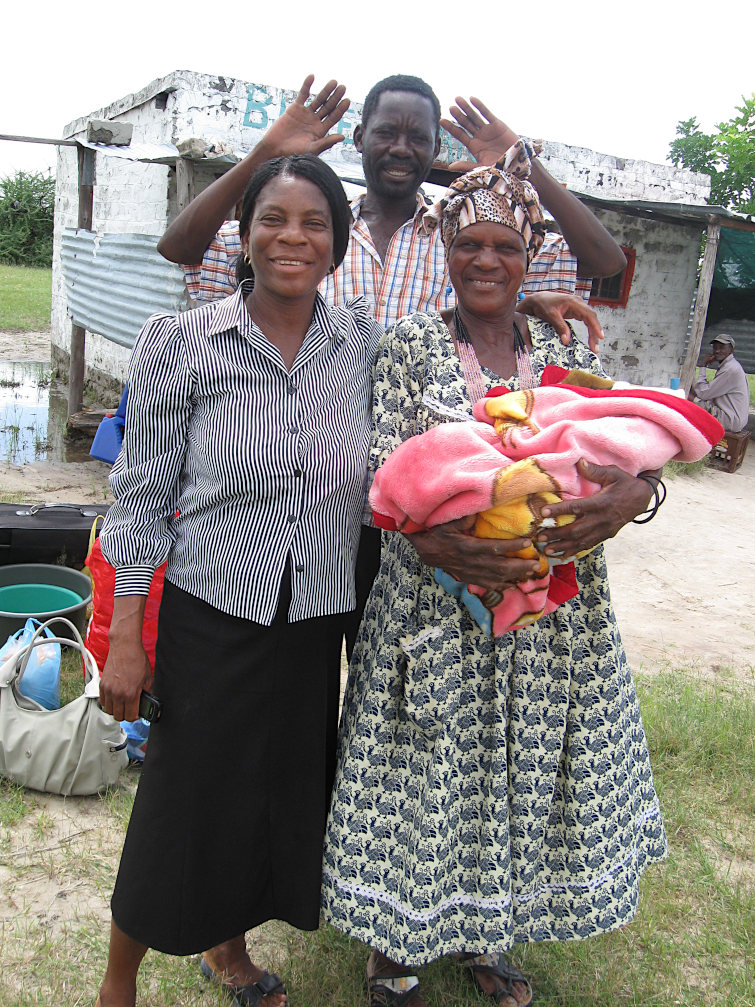
After long and bumpy ride we arrived at grandmother's house. The baby was welcomed with songs and we took some photos – mother, sister, grandma, baby and drunk local chief. The mother had to be dissuaded from coming with us to the activity.
Topical Tips – Do you get enraged when you have waited ten minutes for a Tesco car parking space only for a selfish motorist to drive into the vacant space in front of you? Do you worry that someone might damage your car while you are doing the family shopping? Well here is a novel idea from a friend. He spent Xmas on a farm near Windhoek with a researcher trapping and tagging rather wild animals. He received a call from the friend asking if he was in Windhoek and they arranged to meet in the car park of a well-know hyper-market. When he arrived the friend had a small truck with a large object in the back covered with a heavy tarpaulin. The friend asked if he would look out for the truck while he went into the supermarket. He asked what was in the back …….. “a leopard”.
Of course if it is difficult to get a leopard you could always use a lion or pack of hyenas, but one further tip – don't use a giraffe, it is a bit of a give-away and difficult to flat pack.
The Triumph of Christianity – It has taken two thousand years, but I was there at Christianity's greatest moment of recognition. Yes, there in the perfumed aisles of Shoprite supermarket came the confirmation. Just after the stunning news that health-giving chicken noodles were at a knock down price the nice South African lady made it official.
“ And you cannot do better than the English Holy Bible!”
How the martyrs must have gently smiled, and at a knock down price too.
The Anticipation Is Often Better Than The Event! – Before Xmas Lucas was beside himself. Our organisation was selling an old 4x4 and Lucas decided that he must buy it. He pestered me to find out why they were taking so long to sell it. Eventually a Dutch auction was announced. To his delight his bid won. It wasn't even dampened by the news that an expensive repair was needed.
I asked Lucas how he felt about it.
“ It is life achievement.” He beamed.
For Lucas, a driver, with limited income it was a huge step up in status in his village. Everyone agreed that the car was very cheap and Lucas was much admired. The car was covered in traditional celebratory mud and arrangements were made for a ceremony.
Some weeks later Lucas was not looking so happy.
“ This car take every dollar I have in petrol” he sighed.
“ Are people expecting you to give them lifts?
He was glad to tell someone of his problems. First his friend wanted to borrow the car. It is normal in Africa to share things, so Lucas said he could as long s he put fuel in it. The friend took it to a shebeen, not the important family event that Lucas thought it was needed for. When he came back Lucas asked about the fuel.
“ I left some money in the car”, about one tenth of the cost.
The very next night there was a terrible lightening storm. Two teenagers were struck by lightning as they walked home. Lucas had the car and had to take the dead boy and the injured boy to the police and then to the hospital. He came back at 3 in the morning.
“ and then you have to give lifts to the elders.”
“ Can't you tell them that they have to pay for petrol?”
“ Some of them don't even know about petrol.”
“ So why don't you tell them you don't have enough fuel.”
“ Then they see you drive to work the next morning and speak bad things about you.”
Lucas is thinking about leaving his new car parked at work some weekends. Be careful what you wish for.
The Koi-San Lord Lucan – and while we are on the subject of Lucas………..
Lucas was married a year and a half ago. Because they wanted to earn enough money to improve their economic and social position they agreed that she should keep her job in Walvis Bay a 14 hour combi-ride away. When I spoke to her she said it was too difficult to find work in the North. So that left Lucas in the difficult position of being separated from his new wife for all but a few weeks of the year. In spite of that they managed to produce a beautiful baby boy from whom he also parted for long periods. This is still a common African experience and one that stretches back more than a century, when white settlers could offer contract work and the mines needed migrant labour.
Things became more difficult when, because of his marital status, his sisters were no longer allowed to cook, clean and garden for him, although they lived in the same compound. He was now a married man and his wife should fulfil those roles. There was only one solution – a live-in house person, another common situation for working people no longer able to sustain traditional family roles. Lucas put word out that he was looking for someone.
Before long a woman he knew from work in a town some 200 kms away phoned to say she had a young Koi-San woman who was interested. She duly arrived and started work. Samuel was obviously a bit uncomfortable with new arrangement. Firstly he wanted a man really, but OK beggars can't be choosers. Then he found that she was spooked by the colourful murals his brother had painted on the house walls. She was sure that a painting of a slightly wicked-looking old man had an evil eye on her. Then he asked her how old she was. She replied that she was eleven.
“ These people don't know how old they are” he explained. “She is at least thirty, but they don't read and write and she doesn't have a birth certificate or ID card.”. He was uncomfortable. How was he to pay her. He wanted her to have a bank account, but without ID she couldn't open one.
“ If I give her money, she will just waste it and have nothing to take home.”
However, the long discussions and planning were interrupted by a phone call. A woman from Okongo, where she came from had obtained Lucas's number. It turned out that the simple young Koi-San women was, in fact, a fugitive from the law, hiding out under the guise of being a house keeper. She was to go home that first weekend so Lucas asked us to drop her as we were travelling to work in her direction. We put her in a taxi and gave the taxi driver money for her ride. She has not been seen again and the bag of clothes she stole has long been distributed to family and friends. So, if you know of a good house keeper……
Simple Pleasures
One of the joys of my stay in Namibia has been working with young people living with HIV. As medication and treatment regimes improve it becomes increasingly possible to avoid HIV positive parents passing HIV to their unborn children. Most of these children and adolescents were unlucky to have been born before this was possible.
One of the initiatives we were able to take was a residential workshop with young people. The first was with children 8-12 years old. Inatu and Joseph had done wonderful work with them using art, games, discussion, walks and much more to build their understanding, self-worth and confidence. Having been responsible for planning and supporting the workshop I wanted to be there at the close, particularly to make sure that the transport turned up to the out of town centre.
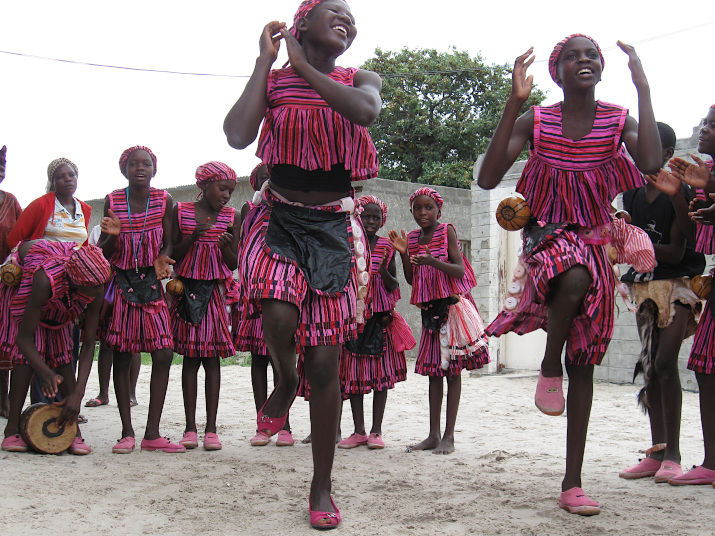
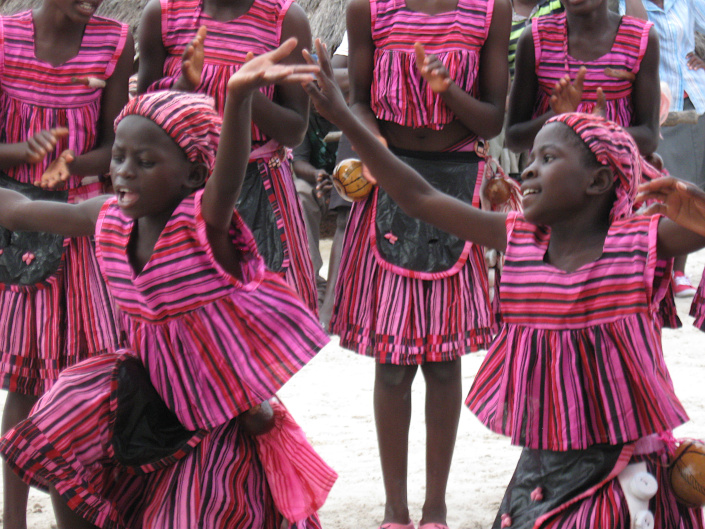
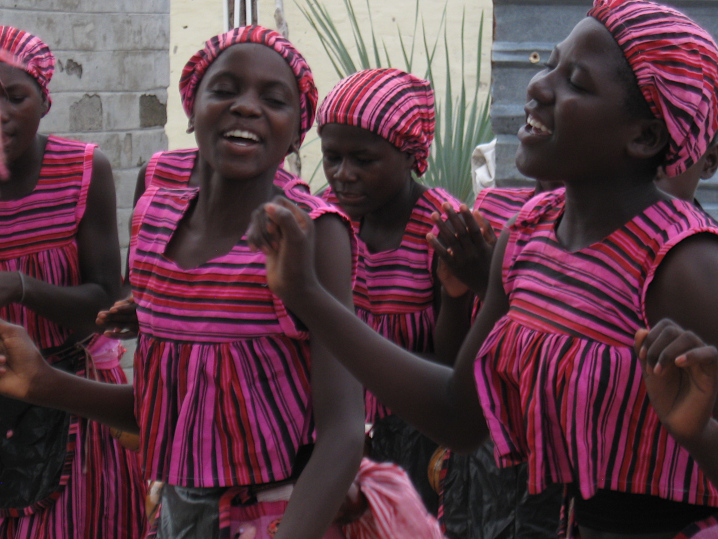
Everyone was full of energy and excitement. Children ran back and forth playing, squealing and somehow fitting in bringing their few belongings to the pick up point. Late, but welcome nonetheless, the bus arrived and children climbed aboard.
Inatu noticed that a group of girls was missing. She hurried off to find them. Some ten minutes later the girls ran to the bus and Inatu relaxed.
“ What was the problem?”
“ They wanted to fit in a final shower before the bus came.”
These young girls had never had a cold-water shower before. Washing for them was from a bucket in the township. One more chance to experience such luxury was just too good to pass up.
Newspaper Report
Man fined six cattle for having sex with goats
A man at Simanya village west of Rundu was fined six head of cattle after pleading guilty to having had sex with goats on various occasions.
The man, who was identified only by the name of ‘Ngongo', was arraigned before an Ukwangali Traditional Court hearing last Saturday at Simanya village, situated 150 kilometres west of Rundu.
According to Simanya village senior Headman Matheus Nyambe, the complainant, a certain Anton Mukunga, alleged that he had on two occasions tracked footprints of a person coming out of his goats' pen as he opened the gate to allow the goats out for grazing. But he said he never suspected theft because none of his goats was missing. However, when he went to take out the goats for grazing the third time, Mukunga saw clothes hanging on poles at the goats' pen.
Upon closer inspection, he saw a naked man having sex with one of the goats inside the pen.
The man ran away, still naked, upon realising that the owner of the goats had spotted him. He was quickly caught by people who chased after him.
During the traditional court hearing, the culprit admitted to having ‘sexual affairs with the goats'. When he was asked why he had sex with animals instead of human beings, ‘Ngongo' responded that he once proposed to a woman who refused him, and that discouraged him from ever proposing to a woman again. It came to light during the hearing that the man had had sex with several of the 17 goats in the pen before he put a mark on the hoofs of one of the goats which best satisfied his sexual needs. He told the court that he had marked the goat so that he could identify it easily whenever he went to the pen.
The culprit, who said he is illiterate and does not know his own age, has agreed to pay the fine. – Nampa.
Back to "Contents"
***************************
|